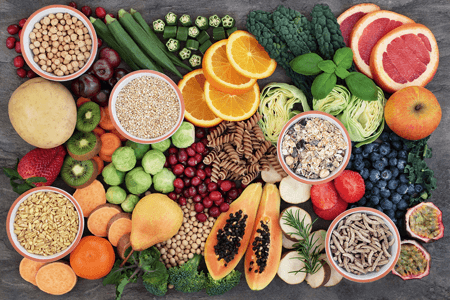The Importance of Dietary Fibre – What is Fibre?

Dr. Gordon Chang
What is Fibre?
Fibre is a component of the cell walls of plants and helps hold the plant together. Although most fibres are carbohydrates they cannot be digested by the human body so fibre does not contribute calories to one’s diet. There are actually two primary types of fibre - soluble fibre and insoluble fibre.
Dietary fibre is derived from plant sources such as fruits, vegetables, and grains and contributes to a healthy diet and lifestyle. Most people consume different types of fibre daily without realizing it. Whole-wheat breads, pears and carrots each contribute fibre to the diet, but the benefit of each will vary. By eating a varied diet of fruits, vegetables, whole grains & cereals, and legumes, one can incorporate different types of fibre in one’s diet.
The functions of fibre will vary depending on the type of fibre. Psyllium and flax seed are insoluble fibres; guar gum and fruit pectins are soluble fibres. Insoluble fibres are like sponges; they absorb and hold water adding bulk to stool which improves bowel movements, and as they pass through the colon, insoluble fibres help cleanse the interior walls of the bowels. Scientific research has shown that this cleansing action may help prevent colorectal cancers and diverticulitis (bacterial infection of the diverticula, tiny pockets in the small intestine).
Soluble fibres, such as in fruit pectins and guar gum, are helpful in preventing atherosclerosis by reducing high cholesterol and triglycerides, thereby decreasing one’s risk of heart disease and stroke.
How Much Fibre is Healthy?
Unfortunately, modern food science has led to a decrease in the fibre content of our foods and the use of processed, refined “foods” in manufacturing only adds to a further decrease of fibre in most packaged foods. It is estimated that the average North American consumes only 12 to 20 grams of fibre daily - yet just to maintain health one should be consuming 25 to 35 grams of fibre daily, and 30 to 40 grams of fibre if one wishes to decrease one’s chance of developing colorectal diseases such as diverticulitis and cancer.
The average individual can certainly benefit from adding more fibre to their diet but increasing fibre intake too quickly can lead to minor health problems such as bloating, stomach or bowel cramps and intestinal gas. It is better to increase fibre content to your diet gradually to allow your digestive tract to adapt.
One can easily add more fibre to one’s diet by eating more fresh fruits and raw vegetables and whole grains. Cooking may break down some types of fibre and also slightly decrease their fibre content and avoid peeling the skins of fruits and vegetables to obtain even more fibre. Eat more whole grain rice, pastas and breads, home-made cookies and muffins (low fat of course) instead of white rice or bread and processed baked goods to help improve your daily intake of fibre.
Healthy Colon Plus is a daily fibre formula manufactured by Omega Alpha Pharmaceuticals which contains psyllium seed and husk, flax seed, glucomannan, apple and citrus pectins, guar gum, the medicinal herbs slippery elm and marshmallow root, citrus bioflavonoids, FOS (fructo-oligosaccharides, a pre-biotic) and four different probiotics. All of these ingredients contribute to healthy digestion, prevention of bowel diseases and at 4g of total dietary fibre per serving, Healthy Colon Plus is an excellent source of daily fibre.
Health Disclaimer. Copyright ©2006-2018 Omega Alpha Pharmaceuticals Inc. Published with permission. Dr. Gordon Chang holds a Ph.D. in Physiology and Biomedical engineering from the University of Toronto and has years of post-doctoral experience in biochemistry.
